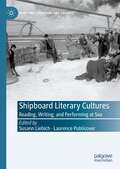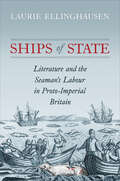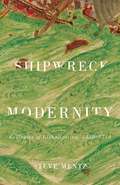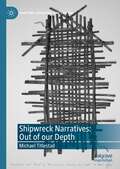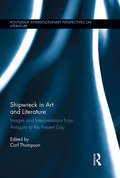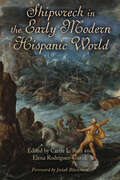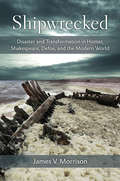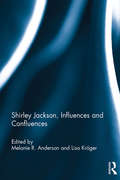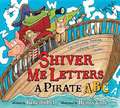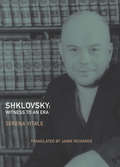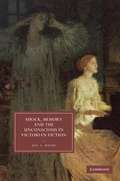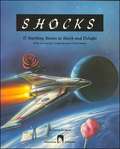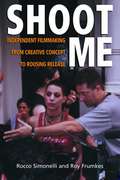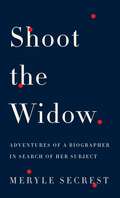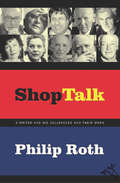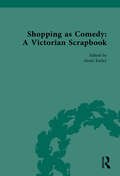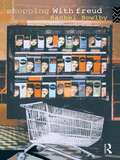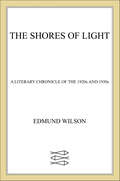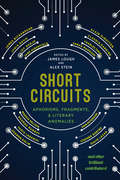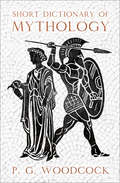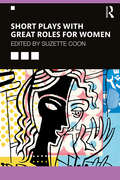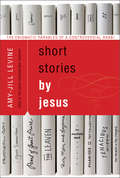- Table View
- List View
Shipboard Literary Cultures: Reading, Writing, and Performing at Sea (Maritime Literature and Culture)
by Laurence Publicover Susann LiebichThe essays collected within this volume ask how literary practices are shaped by the experience of being at sea—and also how they forge that experience. Individual chapters explore the literary worlds of naval ships, whalers, commercial vessels, emigrant ships, and troop transports from the seventeenth to the twentieth-first century, revealing a rich history of shipboard reading, writing, and performing. Contributors are interested both in how literary activities adapt to the maritime world, and in how individual and collective shipboard experiences are structured through—and framed by—such activities. In this respect, the volume builds on scholarship that has explored reading as a spatially situated and embodied practice. As our contributors demonstrate, the shipboard environment and the ocean beyond it place the mind and body under peculiar forms of pressure, and these determine acts of reading—and of writing and performing—in specific ways.
Ships of State: Literature and the Seaman’s Labour in Proto-Imperial Britain
by Laurie EllinghausenThe ideological roots of the British Empire have been widely discussed in early modern studies, as have maritime settings in the period’s imaginative writing. However, these perspectives have not adequately accounted for how literature’s evolving representations of the common British seaman shaped the early stages of public discourse about Britain’s imperial endeavours. Filling that gap in scholarship, Ships of State argues that literary representations of seaborne labour play a distinct and crucial role in the early formation of British imperial attitudes. The book analyses these representations across an array of popular genres: New World promotion tracts, civic pageantry, stage drama, and broadside ballads. These genres demonstrate how imaginative modes of discourse both reflected and influenced popular conceptions of the common seaman and, by extension, the national ambitions he represented. Placing these depictions into dialogue with the larger national conversation about maritime expansion, Ships of State sheds new light on the role of seaborne labour and its literary representations in creating and sustaining empire.
Shipwreck Modernity: Ecologies of Globalization, 1550–1719
by Steve MentzShipwreck Modernity engages early modern representations of maritime disaster in order to describe the global experience of ecological crisis. In the wet chaos of catastrophe, sailors sought temporary security as their worlds were turned upside down. Similarly, writers, poets, and other thinkers searched for stability amid the cultural shifts that resulted from global expansion. The ancient master plot of shipwreck provided a literary language for their dislocation and uncertainty.Steve Mentz identifies three paradigms that expose the cultural meanings of shipwreck in historical and imaginative texts from the mid-sixteenth through the early eighteenth centuries: wet globalization, blue ecology, and shipwreck modernity. The years during which the English nation and its emerging colonies began to define themselves through oceangoing expansion were also a time when maritime disaster occupied sailors, poets, playwrights, sermon makers, and many others. Through coming to terms with shipwreck, these figures adapted to disruptive change.Traces of shipwreck ecology appear in canonical literature from Shakespeare to Donne to Defoe and also in sermons, tales of survival, amateur poetry, and the diaries of seventeenth-century English sailors. The isolated islands of Bermuda and the perils of divine anger hold central places. Modern sailor-poets including Herman Melville serve as valuable touchstones in the effort to parse the reality and understandings of global shipwreck.Offering the first ecocritical account of early modern shipwreck narratives, Shipwreck Modernity reveals the surprisingly modern truths to be found in these early stories of ecological collapse.
Shipwreck Narratives: Out of our Depth (Maritime Literature and Culture)
by Michael TitlestadShipwreck Narratives: Out of Our Depth studies both the representation of shipwreck and the ways in which shipwrecks are used in creative, philosophical, and political works. The first part of the book examines historical shipwreck narratives published over a period of two centuries and their legacies. Michael Titlestad points to a range of narrative conventions, literary tropes and questions concerning representation and its limits in narratives about these historic shipwrecks. The second part engages novels, poems, films, artwork, and musical composition that grapple with shipwreck. Collectively the chapters suggest the spectacular productivity of shipwreck narrative; the multiple ways in which its concerns and logic have inspired anxious creativity in the last century. Titlestad recognizes in weaving in his personal experience that shipwreck—the destruction of form and the advent of disorder—could be seen not only as a corollary for his own neurological disorder, but also an abiding principle in tropology. This book describes how shipwreck has figured in texts (from historical narratives to fiction, film and music) as an analogue for emotional, psychological, and physical fragmentation.
Shipwreck in Art and Literature: Images and Interpretations from Antiquity to the Present Day (Routledge Interdisciplinary Perspectives on Literature)
by Carl ThompsonTales of shipwreck have always fascinated audiences, and as a result there is a rich literature of suffering at sea, and an equally rich tradition of visual art depicting this theme. Exploring the shifting semiotics and symbolism of shipwreck, the interdisciplinary essays in this volume provide a history of a major literary and artistic motif as they consider how depictions have varied over time, and across genres and cultures. Simultaneously, they explore the imaginative potential of shipwreck as they consider the many meanings that have historically attached to maritime disaster and suffering at sea. Spanning both popular and high culture, and addressing a range of political, spiritual, aesthetic and environmental concerns, this cross-cultural, comparative study sheds new light on changing attitudes to the sea, especially in the West. In particular, it foregrounds the role played by the maritime in the emergence of Western modernity, and so will appeal not only to those interested in literature and art, but also to scholars in history, geography, international relations, and postcolonial studies.
Shipwreck in the Early Modern Hispanic World (Campos Ibéricos: Bucknell Studies in Iberian Literatures and Cultures)
by Julio Baena Carmen Hsu Fernando Rodríguez Mansilla Natalio Ohanna Ana M. Rodríguez-Rodríguez Elena Rodríguez-Guridi Carrie L. Ruiz Noemí Martín SantoSeafaring activity for trade and travel was dominant throughout the Spanish Empire, and in the worldview and imagination of its inhabitants, the specter of shipwreck loomed large. Shipwreck in the Early Modern Hispanic World probes this preoccupation by examining portrayals of nautical disasters in sixteenth- and seventeenth-century Spanish literature and culture. The essays collected here showcase shipwreck’s symbolic deployment to question colonial expansion and transoceanic trade; to critique the Christian enterprise overseas; to signal the collapse of dominant social order; and to relay moral messages and represent socio-political debates. The contributors find examples in poetry, theater, narrative fiction, and other print artifacts, and approach the topic variously through the lens of historical, literary, and cultural studies. Ultimately demonstrating how shipwrecks both shaped and destabilized perceptions of the Spanish Empire worldwide, this analytically rich volume is the first in Hispanic studies to investigate the darker side of mercantile and imperial expansion through maritime disaster.
Shipwrecked: Disaster And Transformation In Homer, Shakespeare, Defoe, And The Modern World
by James V. MorrisonShipwrecked: Disaster and Transformation in Homer, Shakespeare, Defoe, and the Modern World presents the first comparative study of notable literary shipwrecks from the past four thousand years, focusing on Homer s Odyssey, Shakespeare s The Tempest, and Defoe s Robinson Crusoe. James V. Morrison considers the historical context as well as the triggers (such as the 1609 Bermuda shipwreck) that inspired some of these works, and modern responses such as novels (Golding s Lord of the Flies, Coetzee s Foe, and Gordon s First on Mars, a science fiction version of the Crusoe story), movies, television (Forbidden Planet, Cast Away, and Lost), and the poetry and plays of Caribbean poets Derek Walcott and Aime Cesaire. The recurrent treatment of shipwrecks in the creative arts demonstrates an enduring fascination with this archetypal scene: a shipwreck survivor confronting the elements. It is remarkable, for example, that the characters in the 2004 television show Lostshare so many features with those from Homer s Odyssey and Shakespeare s The Tempest. For survivors who are stranded on an island for some period of time, shipwrecks often present the possibility of a change in political and social status as well as romance and even paradise. In each of the major shipwreck narratives examined, the poet or novelist links the castaways arrival on a new shore with the possibility of a new sort of life. Readers will come to appreciate the shift in attitude toward the opportunities offered by shipwreck: older texts such as the Odyssey reveals a trajectory of returning to the previous order. In spite of enticing new temptations, Odysseus and some of the survivors in The Tempest revert to their previous lives, rejecting what many might consider paradise. Odysseus is reestablished as king; Prospero travels back to Milan. In such situations, we may more properly speak of potential transformations. In contrast, many recent shipwreck narratives instead embrace the possibility of a new sort of existence. That even now the shipwreck theme continues to be treated, in multiple media, testifies to its long-lasting appeal to a very wide audience. "
Shirley Jackson, Influences and Confluences
by Lisa Kröger Melanie AndersonThe popularity of such widely known works as "The Lottery" and The Haunting of Hill House has tended to obscure the extent of Shirley Jackson's literary output, which includes six novels, a prodigious number of short stories, and two volumes of domestic sketches. Organized around the themes of influence and intertextuality, this collection places Jackson firmly within the literary cohort of the 1950s. The contributors investigate the work that informed her own fiction and discuss how Jackson inspired writers of literature and film. The collection begins with essays that tease out what Jackson's writing owes to the weird tale, detective fiction, the supernatural tradition, and folklore, among other influences. The focus then shifts to Jackson's place in American literature and the impact of her work on women's writing, campus literature, and the graphic novelist Alison Bechdel. The final two essays examine adaptations of The Haunting of Hill House and Jackson's influence on contemporary American horror cinema. Taken together, the essays offer convincing evidence that half a century following her death, readers and writers alike are still finding value in Jackson’s words.
Shiver Me Letters: A Pirate ABC
by June SobelThe captain of this brave and bumbling pirate crew has ordered them to capture the entire alphabet--and they'll walk the plank if they're missing a single letter! Now these swashbuckling mateys are embarking on an alphabet adventure unlike any other, and they won't (ahem,can't) rest until they've found anA, aZ, and everything in between. June Sobel's hilarious text and Henry Cole's adventurous animal pirates harmonize in an irresistible book for alphabet-learning, pirate-loving kids everywhere.
Shklovsky: Witness to an Era
by Jamie Richards Serena VitaleShklovsky: Witness to an Era is a blend of riotous anecdote, personal history, and literary reflection, collecting interviews with Viktor Shklovsky conducted by scholar Serena Vitale in the '70s, toward the end of the great critic's life, and in the face of interference and even veiled threats of violence from the Soviet government. Shklovsky's answers are wonderfully intimate, focusing particularly on the years of the early Soviet avant-garde, and his relationships with such figures as Eisenstein and Mayakovsky. Bearing witness to a vanished age whose promise ended in despair, Shklovsky is in great form throughout, summing up a century of triumphs and disappointments, personal and historical.
Shklovsky: Witness to an Era
by Jamie Richards Serena VitaleShklovsky: Witness to an Era is a blend of riotous anecdote, personal history, and literary reflection, collecting interviews with Viktor Shklovsky conducted by scholar Serena Vitale in the '70s, toward the end of the great critic's life, and in the face of interference and even veiled threats of violence from the Soviet government. Shklovsky's answers are wonderfully intimate, focusing particularly on the years of the early Soviet avant-garde, and his relationships with such figures as Eisenstein and Mayakovsky. Bearing witness to a vanished age whose promise ended in despair, Shklovsky is in great form throughout, summing up a century of triumphs and disappointments, personal and historical.
Shklovsky: Witness to an Era
by Jamie Richards Serena VitaleShklovsky: Witness to an Era is a blend of riotous anecdote, personal history, and literary reflection, collecting interviews with Viktor Shklovsky conducted by scholar Serena Vitale in the '70s, toward the end of the great critic's life, and in the face of interference and even veiled threats of violence from the Soviet government. Shklovsky's answers are wonderfully intimate, focusing particularly on the years of the early Soviet avant-garde, and his relationships with such figures as Eisenstein and Mayakovsky. Bearing witness to a vanished age whose promise ended in despair, Shklovsky is in great form throughout, summing up a century of triumphs and disappointments, personal and historical.
Shock, Memory and the Unconscious in Victorian Fiction
by Jill L. MatusJill Matus explores shock in Victorian fiction and psychology with startling results that reconfigure the history of trauma theory. Central to Victorian thinking about consciousness and emotion, shock is a concept that challenged earlier ideas about the relationship between mind and body. Although the new materialist psychology of the mid-nineteenth century made possible the very concept of a wound to the psyche - the recognition, for example, that those who escaped physically unscathed from train crashes or other overwhelming experiences might still have been injured in some significant way - it was Victorian fiction, with its complex explorations of the inner life of the individual and accounts of upheavals in personal identity, that most fully articulated the idea of the haunted, possessed, and traumatised subject. This wide-ranging book reshapes our understanding of Victorian theories of mind and memory and reveals the relevance of nineteenth-century culture to contemporary theories of trauma.
Shocks: 15 Startling Stories to Shock and Delight
by Burton GoodmanThis book contains 15 exciting stories by some of the world's greatest writers. As the title suggests, each story provides a shock. These tales offer you hours of reading pleasure. And the exercises that follow will help you improve your reading and literature skills.
Shoot Me: Independent Filmmaking from Creative Concept to Rousing Release
by Rocco Simonelli Roy FrumkesWhen the script says "shoot me" and Hollywood says no, your only alternative is to raise the money and do it yourself. Here's how screenwriters Roy Frumkes and Rocco Simonelli used digital video to do just that. Witty, original, and ruthlessly on the mark, this unvarnished look at independent film-making chronicles both the creative intricacies of collaboration and the tricks of staying in budget and out of court. The authors compare notes as they describe the entire film-making process, with coverage including:* Targeting the audience for the script and tailoring the script for the audience* Raising money: your friends, your family, and the millionaire next door* Casting: names, no-names, and personality nightmares* Locations: finding them, securing them, and sometimes even stealing them* Producing: creating a budget, scheduling the shoot, and dealing with unions* Directing: working with actors and protecting your vision* Editing: or dropping that scene you thought was a gem* Celebrating, publicizing, and distributing the finished product
Shoot the Widow: Adventures of a Biographer in Search of Her Subject
by Meryle SecrestThe first rule of biography, wrote Justin Kaplan: "Shoot the widow."In her new book, Meryle Secrest, acclaimed biographer ("Knowing, sympathetic and entertainingly droll"--The New York Times), writes about her comic triumphs and misadventures as a biographer in search of her nine celebrated subjects, about how the hunt for a "life" is like working one's way through a maze, full of fall starts, dead ends, and occasional clear passages leading to the next part of the puzzle.She writes about her first book, a life of Romaine Brooks, and how she was led to Nice and given invaluable letters by her subject's heir that were slid across the table, one at a time; how she was led to the villa of Brooks' lover, Gabriele d'Annunzio (poet, playwright, and aviator), a fantastic mausoleum left untouched since the moment of his death seventy years before; to a small English village, where she uncovered a lost Romaine Brooks painting; and finally, to 20, rue Jacob, Paris, where Romaine's lover, Natalie Barney, had fifty years before entertained Cocteau, Gide, Proust, Colette, and others.Secrest describes how her next book--a life of Berenson--prompted Francis Steegmuller, fellow biographer, to comment that he wouldn't touch the subject with a ten-foot pole.For her life of British art historian Kenneth Clark, Secrest was given permission to write the book by her subject, who surreptitiously financed it in the hopes of controlling its contents; we see how Clark's plan was foiled by a jealous mistress and a stash of love letters that helped Secrest navigate Clark's obstacle course.Among the other biographical (mis)adventures, Secrest reveals: how she tracked Salvador Dalí to a hospital room, found him recovering from serious burns sustained in a mysterious fire, and learned that he was knee-deep in a scandal involving fake drawings and prints and surrounded by dangerous characters out of Murder, Inc. . . . and how she went in search of a subject's grave (Frank Lloyd Wright's) only to find that his body had been dug up to satisfy the whim of his last wife.A fascinating account of a life spent in sometimes arduous, sometimes comical, always exciting pursuit of the truth about other lives.From the Hardcover edition.
Shop Talk: A Writer and His Colleagues and Their Work
by Philip RothThe legendary author&’s essays and interviews explore how fellow writers from Milan Kundera to Edna O&’Brien are influenced by time, place, and politics. Writers are often deeply influenced by the time and place in which they live and write. In Shop Talk, Philip Roth, winner of a National Book Award, a Pulitzer Prize, and numerous other literary honors, explores the intimate relationship a writer&’s experience has with his or her work. In a series of essays, Roth recounts his intellectual encounters with writers, discussing with them the diverse regions from which they hail and pondering the influence of locale, politics, and history on their work. Featuring luminaries such as Milan Kundera discussing Czechoslovakia; Primo Levi talking about Auschwitz; Edna O&’Brien reflecting on Ireland; Isaac Bashevis Singer tackling Warsaw; Aharon Appelfeld on Bukovina; and Ivan Klíma on Prague, Roth&’s conversations touch on the conditions that inspire great art, with artists as attuned to the subtleties of their societies as they are the nuances of words. Also including a portrait of Bernard Malamud, a written exchange with Mary McCarthy about Roth&’s The Counterlife, and the essay &“Rereading Saul Bellow,&” Shop Talk is a &“fascinating [glimpse] of some of the deans of postwar literature&” (Los Angeles Times Book Review).
Shopping as Comedy: A Victorian Scrapbook
by Alexis EasleyThis volume is a critical edition of a Victorian scrapbook, composed of cuttings from advertising images from the 1880's. These images are arranged in hand-drawn domestic spaces and embellished with watercolour details. At the foot of each page is a handwritten running text, written by an unknown Victorian author, that provides a narrative to explain the accompanying images. The album also includes four original short stories, interspersed by twenty-three vignettes, which, like advertisements in a magazine, echo and reinforce themes in the surrounding content. The album highlights issues of concern to women at the fin de siècle: romance, marriage, shopping, and house decoration. The satirical commentary on late Victorian shopping and commodity culture provides a fascinating insight into the interests and responses of consumers during this period. The volume will be of great interest to students and scholars of literary and advertising history.
Shopping with Freud
by Rachel BowlbyWhat is a consumer? Shopping with Freud looks at some of the surprising ways in which the consumer subject appears in a range of writings - from literature to marketing psychology to psychoanalysis. Rachel Bowlby shows how ideas about consumption are brought to bear on contemporary conceptions of choice in areas that seem far removed from a straightforward matter of shopping. She also shows that arguments and assumptions about the psychology of consumers themselves throw light on genderal questions of human psychology.
Shores of Light: A Literary Chronicle of the 1920s and 1930s
by Edmund WilsonA literary chronicle of the Twenties and Thirties from the brilliant mind of Edmund WilsonShores of Light covers a vast range of authors including Sherwood Anderson, Ring Lardner, Eugene O'Neill, e. e. cummings, Woodrow Wilson, H.L. Mencken, Ernest Hemingway, Gertrude Stein, Elinor Wylie, Edna St. Vincent Millay, Andre Malraux, Henry Miller, W.H. Auden, Nicola Sacco and Bartolomeo Vanzetti.
Short Circuits: Aphorisms, Fragments, and Literary Anomalies
by James Lough Alex SteinFollowing up on the success of their first anthology of aphorisms, Short Flights, editors James Lough and Alex Stein have returned with a new volume that expands on the theme of aphorisms to include other short form writing and concrete poetry and prose from several of the world's leading, award-winning, and bestsellling writers in the genre, including Charles Simic, Lydia Davis, Sarah Manguso, Jane Hirschfield, Joy Harjo, Yahia Labadidi, Claudia Rankine, and Stephen Dobyns.
Short Dictionary of Mythology
by P. G. WoodcockThis concise A-to-Z reference volume offers definitions and historical contexts for mythological characters and terms. With in-depth coverage of ancient Greek and Roman mythology, this concise yet comprehensive dictionary includes information on the mythological systems of Asia and Africa. Entries include gods, emperors, and other major figures, as well as lesser-known characters and archaic terminology. Legendary figures such as the Greek poet Homer and Alexander the Great are included alongside mythical characters such as Apollo, Pandora, and Medusa.
Short Plays with Great Roles for Women
by Suzette CoonShort Plays with Great Roles for Women is an antidote to the traditional underrepresentation of women on stage, by offering twenty-two short plays that put women right at the centre of the action. The push for more women’s roles has gathered force over the last few years, and this collection is part of that movement, with rich, intelligent roles for women of all ages and backgrounds. This anthology offers a vital slice of life, addressing relevant and diverse topics such as: a young, Islamic woman coming out to her religious mother; black women’s navigation of the natural hair movement; bullying in a small-town American school; social media addiction; and the trials and tribulations of family life. Plays from award-winning playwrights are supported by original production details and playwrights’ afterwords, forming a broad and comprehensive collection of complete texts that offer full character journeys. Appealing to aspiring performers, playwrights, directors and students, Short Plays with Great Roles for Women is an essential resource for actor training, assessments, showcases, show-reels, short films and theatre performances.
Short Stories
by Henry I. Christ Jerome ShostakThe collection of stories in this book is quite different that students want in stories of proved merit. They provide a variety of settings, from the turmoil of the inner city to the lonely reaches of the desert. They can be classified as mysteries, detective stories, fantasy, science fiction, exhibitions of courage, human-interest stories, and tales of the unexpected providing humor, character study, suspense, and a compassionate understanding of many types of people.
Short Stories by Jesus: The Enigmatic Parables of a Controversial Rabbi (Short Stories By Jesus Ser.)
by Amy-Jill LevineJesus was a skilled storyteller and perceptive teacher who used images from everyday life to stir up interest in his message about the Kingdom of God. But life in first-century Galilee and Judea was very different from our world today, and many traditional interpretations of Jesus's stories not only ignore this difference, but also often import anti-Jewish and sexist views. As eminent Bible scholar Amy-Jill Levine writes in Short Stories by Jesus:Jesus was requiring that his disciples do more than listen; he was asking them to think as well. What makes the parables mysterious, or difficult, is that they challenge us to look into the hidden aspects of our own values, our own lives. They bring to the surface unasked questions, and they reveal the answers we have always known, but refuse to acknowledge. Religion has been defined as designed to comfort the afflicted and to afflict the comfortable. We do well to think of the parables of Jesus as doing the afflicting. Therefore, if we hear a parable and think, "I really like that" or, worse, fail to take any challenge, we are not listening well enough.In this wise, entertaining, and educational book, Levine explores Jesus's most popular parables, revealing their hidden depths, exposing their misinterpretations, and showing how they can still challenge and provoke us two thousand years later.
